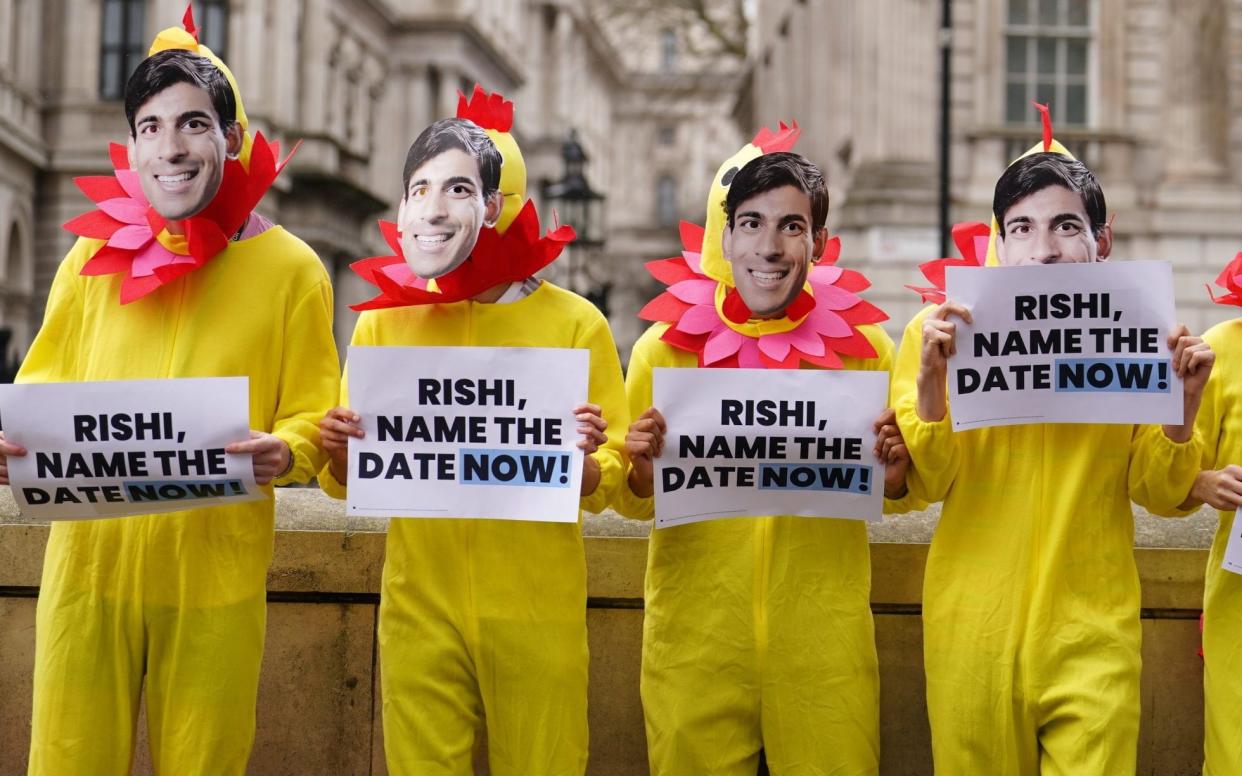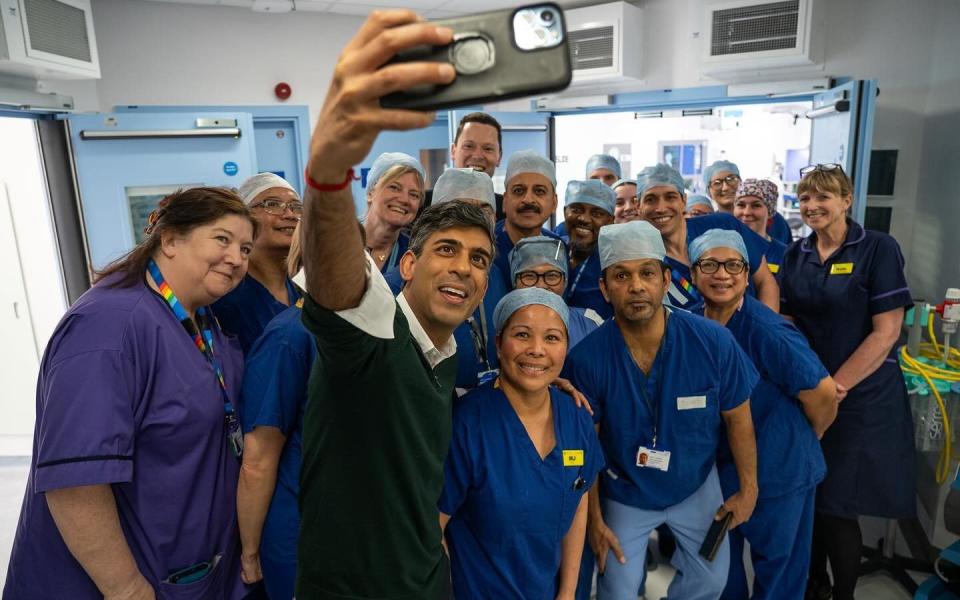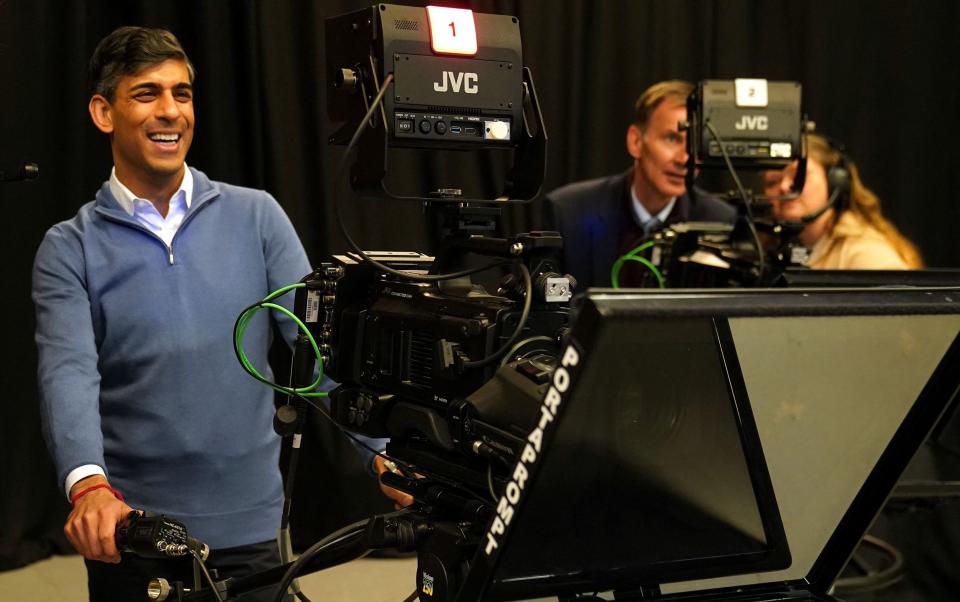How Sunak bowed to the whips and chickened out of a spring election

- Oops!Something went wrong.Please try again later.
- Oops!Something went wrong.Please try again later.
Rishi Sunak was on his way to Bristol when he decided to go public ruling out a spring election.
The Prime Minister was on another of his trips away from Westminster – he is often spending three days a week on the road in election year – when the call was made.
That morning and early afternoon, his inner core of trusted aides, a small collection of politicos in their late 30s and early 40s who have his ear, had been debating the point.
For months, the Prime Minister had held the line on a position of constructive ambiguity, saying he expected the vote in the second half of the year but not ruling out going earlier.
But the speculation that he would shock Westminster and go this spring was ramping up, alarming Tory MPs who were stuck in Parliament for late Budget votes, when gossip is rife.
And so, over the phone on Thursday afternoon, the decision was made: the Prime Minister should be explicit when he appeared for a chat with ITV West Country live at 6pm.
“The collective view was better to give a bit more clarity now,” said one Sunak inner circle member involved in the discussions.
“This thing had built up because of Labour and because of rumours circling in SW1 and everyone winding each other up. It was better to kill that dead.”

And so it fell to the Prime Minister to carefully weave one of the biggest political news stories of the week into his interview.
A giveaway that a politician is dropping a pre-planned announcement into a media appearance is when it comes with no question on the specific topic asked.
And so it came, during an unprompted discussion about the local elections on May 2. “I’m squarely focused on those [elections] because they’re important and there’s not going to be a General Election on that day,” Mr Sunak said.
“But when there is a general election, actually what matters is the choice at that election.”
When the presenters picked up on the remark to clarify, the Prime Minister repeated the line: “There won’t be an election on that day.”
Strictly, the remarks only mean that one of the close-to-300 days when the general election could be held between now and the end of January has been ruled out. (The earliest possible date is late April, given the formal notice needed.)
But they have been widely interpreted as meaning a spring election is off.
Forcing voters to go back to the polls twice in a matter of weeks would be a political risk, given the electorate’s already lowly view of Westminster.
It is not impossible. Theresa May timed her snap election in 2017 for June 8 despite local elections being held on May 4. But she then lost the Tory Commons majority, damning her premiership. The choice is still bitterly regretted by her former senior aides.
How seriously was spring considered? Downing Street is now playing down the idea, blaming the Labour Party for elevating the speculation for its political ends.
There is certainly some truth in that. The speed with which the “chicken Sunak” attacks were deployed was testament to as much.
One altered video clip tweeted out by the official Labour Party account just moments after the news dropped saw the Prime Minister walk up to a Downing Street podium only to emit a “cluck”.
On Friday morning, 14 people dressed as chickens with Sunak face masks were sent to stand outside Downing Street holding letters spelling “NAME THE DATE NOW”.
The Liberal Democrats are getting in on the action too. They are considering creating “bottler Sunak” beer bottles, emulating a gimmick from when Gordon Brown dodged a snap election in 2007.
Some Tory MPs were convinced that those around Mr Sunak were, as recently as this week, genuinely considering a spring election, hence a rear-guard action mounted behind the scenes to kill it.
At 6.30pm on Monday, members of the influential 1922 Committee’s executive met for their once-a-parliamentary-term face-to-face talks with the Prime Minister.
Over red and white wine, or teas and coffees for the abstemious, the group gathered in the Prime Minister’s parliamentary office behind the Commons Speaker’s chair for candid discussions.
A simple question
Eyebrows were raised when the Prime Minister made the first business of the meeting a simple question: When should the general election be held?
Ten members of the 1922 exec offered thoughts, according to one present. Seven warned against a spring election. Sir Graham Brady, the 1922 chairman, who met Mr Sunak one-on-one before the wider meeting, was said to be one of them.
Another factor was the Tory Whips’ Office. Simon Hart, the amiable Chief Whip, and his coterie of disciplinarians were also against a spring election, though any claim of rifts with Number 10 is denied.
“The Whips’ Office was very clearly against an election in May,” said one Tory MP who claimed colleagues who feared not keeping their seats if the vote was in May had bombarded the whips, pushing that point.
The political backdrop of the week was also a grim one. There was a high-profile defection, with Lee Anderson, Tory deputy chairman as recently as January, unveiled as a Reform MP.
The move had been sealed late last week over a cup of English tea in central London with Richard Tice, the Reform leader who has declared Mr Anderson his party’s “Red Wall champion”.
The campaign bus tour around Mr Anderson’s Ashfield constituency on Friday will be the first of many. Barnsley is expected to be next. Mr Tice is looking at buying a second campaign bus to drive home the message.
Meanwhile, headlines in the week the Government unveiled a new extremism definition were dominated
by the report Tory mega-donor Frank Hester said Diane Abbott, the independent MP, made him want to “hate all black women”.
Downing Street failed to condemn the comments as racist until Kemi Badenoch, the Business Secretary, widely tipped to run for the Tory leadership at the next chance, went public saying exactly that.
Grant Shapps, another would-be leadership contender, then let it be known on a trip to Poland that he wished defence spending would rise to 3 per cent of GDP.
Cabinet ministers rally round
Cabinet ministers are rallying around the Prime Minister to see off any idea of a leadership switch after reports some had talked through how that could play out. “The party has to learn very rapidly if we don’t all hang together we’ll all hang separately,” said one.
The raw political logic for why autumn is seen almost universally in Tory circles as the most likely election date is clear.
For one, there is the economics. Isaac Levido, the Australian strategist and protege of Sir Lynton Crosby, has this year put the economy at the heart of the Conservative re-election bid.
And on that front, the chances are the economic indicators will be in a better place in six months’ time.
Inflation – the great scourge of the British economy in the eyes of Mr Sunak and Jeremy Hunt, his Chancellor – is set to drop again in figures released this coming Wednesday.

Treasury analysis points to it returning to the 2 per cent Bank of England target in either the figure for May or June, in what is being planned as a victory declaration moment.
The National Insurance cuts announced in both the Autumn Statement and this month’s Budget will have had longer to be felt in people’s pay packages come the autumn.
Plus that would leave time for a third round of NI reductions in a last minute pre-election Budget, in another step towards Mr Hunt’s loose ambition to one day end “double taxation”.
Also, economic growth would, if forecasts prove correct, have picked up by the end of the year. Not to booming levels, but well above the recession suffered in the second half of last year.
Rwanda Bill
And then there is a second reason – small boats. The Rwanda Bill is back in Parliament this week and is due to pass on either Wednesday or Thursday, in a major political moment.
The first deportation flights are being planned for May. If Downing Street’s fervent belief in the robustness of the new law proves true, the summer could see even more flights.
That would force focus onto one of the few rock-hard dividing lines between the Tories and Labour – Sir Keir Starmer’s promise to scrap the Rwanda plan and ground the flights.
Some are circling October as the most likely election month, to avoid a clash with the US presidential vote on Nov 5.
A Daily Express report of a cancellation request for the City of London’s Lord Mayor’s banquet, always attended by the Prime Minister and pencilled in for Nov 11, is seen as a hint that month is still in the running.
Either would require a September declaration. And that means a long hot summer of election date speculation still looms.
But for Downing Street advisers now booking holidays for April and May, that can wait until another day.

